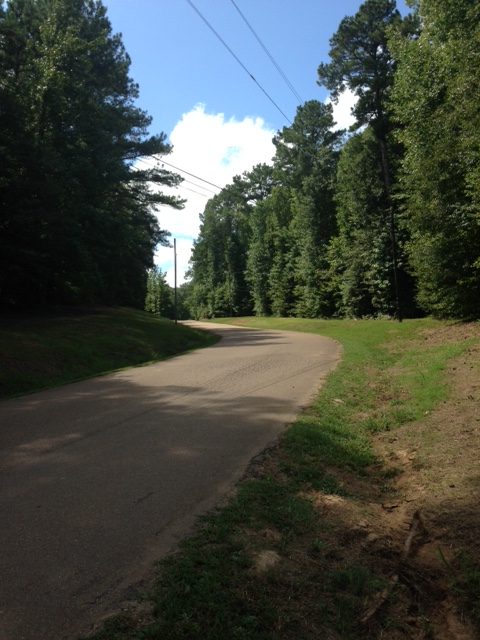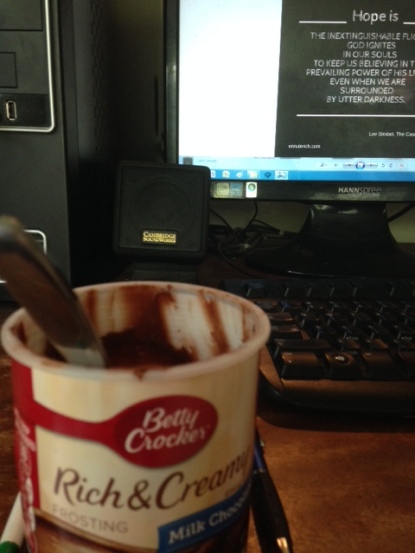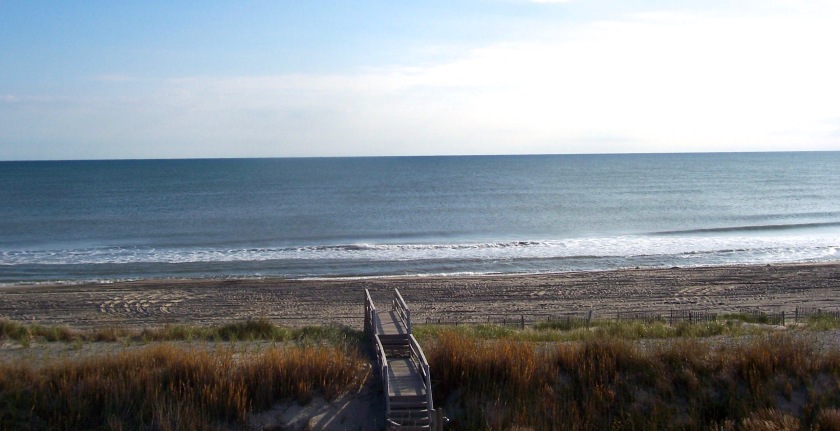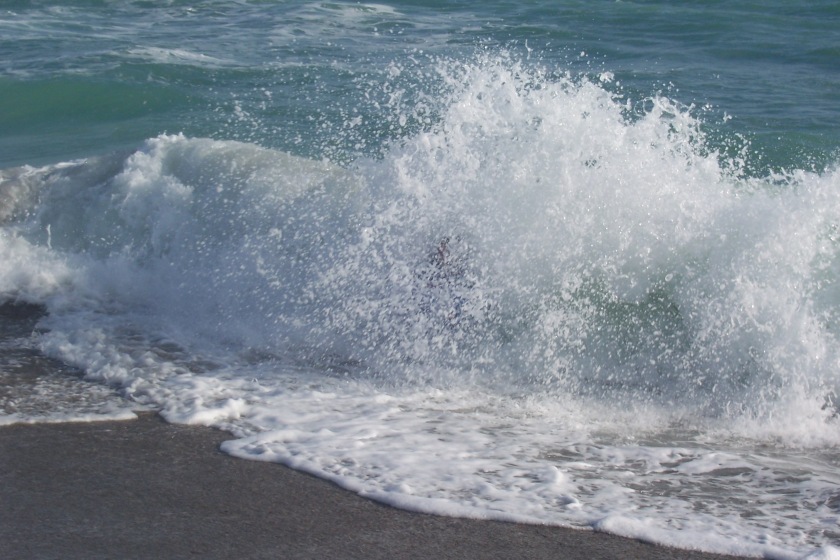I am so excited to welcome Linsey Ewing today. Linsey is my cousin (which makes her FABULOUS in my book) and, even more important, she has a story of hope that she is just beginning to share. Linsey’s courageous post gives an inside view of her fight for hope in the midst of being diagnosed with Bipolar Disorder.
*******************************************
“Hope warriors are people who know their own brokenness, who aren’t afraid of the brokenness they see in others. They are people who say ‘I am with you. You are not alone.’”
When I saw these words on Erin’s blog, I gave a mental cheer.
I’m a Hope Warrior!
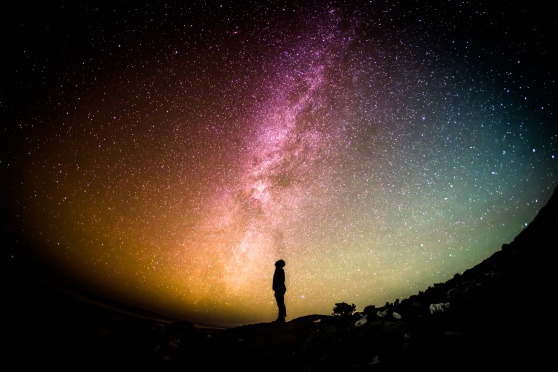
I believe hope is an essentially human quality—what separates us from every other creation in the universe. For a time, though, I forgot this little maxim of mine, and I gave up hope, or I thought I did. I stopped listening to myself and I failed to recognize the great power I had within me—the power that hope gives us.
Now I know I’m a Hope Warrior and I do my best to use that power every day. I’d like to share my story with you, my struggle for hope and how that hope was, for a time, a bent and twisted thing, and the freedom that I’ve found in real hope.
I’ve struggled with depression all my life. Even as a young child I withdrew from people, partly because I am intensely introverted, partly because I would occasionally receive an emotional blow from some heavy, age-inappropriate topic and needed to retreat to process it.
My depression became more pronounced through my adolescence and young adulthood, when hormones and general angst didn’t do me any favors, and I fought it through every means available. I went to therapy, took prescription medication, and self-medicated with a lot of alcohol and a little drug use. Several of those things worked, while I was using them, but none of them treated the underlying problem, mostly because I never realized there was an underlying problem.
Though I got several “diagnoses,” no one explained to me that I had a disease that would require constant attention and treatment. As a result, I would go to therapy or take anti-depressants for a few months, feel better, and stop treatment until it got so bad that I needed help again. And I only got help when it was really bad—when I stopped functioning, couldn’t stop crying, couldn’t get out of bed for a week, or had self-harm fantasies.
The worst of these times was March 2012. In the first months of that year, my life flipped upside down, and I was under extreme pressure. I completely broke down, as I believe anyone would have under the circumstances. I was encouraged seek help, which I did, and I was put on yet another anti-depressant. This time I stayed on it.
Six months later I met some friends at a local bar for drinks. When they were ready to go, I told them I was going to finish my beer and I’d be right behind them, but I didn’t leave after that beer. I stayed another five hours. I drank more beer. I drank a total of eight 16oz cans of beer. I closed the place down, talked to everyone there, almost went home with someone to whom I’d given a fake name, and all but danced on the bar.
At closing, I got in my car and drove home. I passed two police cars, one of which had someone pulled over, but no alarm bells went off. I missed my driveway and had to back up and try again. I walked in the door and fell in my bed fully clothed including shoes.
When I woke up, I couldn’t believe what I had done—literally couldn’t believe I had acted that way. (Remember how I said I was an intense introvert?) I hate talking to strangers. I don’t like bars and will only go if I’m with a friend or a small group and don’t have a choice. I’m not a drinker since my early college (self-medicating) days. I am a rule-follower—it’s not like me to drive drunk or be heedless of authority figures around me.
This behavior was so far outside my character it was like I’d been possessed. I was so ashamed of myself that I spent that Sunday wallowing in self-hatred. First thing Monday I began making calls, trying to find a doctor to help me figure out what happened.
Many months and mental health professionals later, I was diagnosed with Bipolar Disorder, untreated and undiagnosed because I had only ever presented with symptoms of depression and this was my first manic episode. It did, however, mirror an earlier period when I was drinking heavily (self-medicating with a depressant) and acting out wildly, but at that time neither I nor anyone around me was aware I was acting out of character. Basically the depressants (prescription or otherwise) only treated half of my disease, causing the other half to manifest disproportionately.
Bipolar also explained other behaviors that I now know are hypomanic (still potentially harmful, but not as obviously reckless as behaviors typically associated with mania), but that I had always assumed were character flaws or strengths: bouts of frenzied spending; inability to manage my money; times when I would start a dozen projects without completing any of them; times when I would take on more than any reasonable person could expect to accomplish—and pull it off; losing time; and soaring feats of creativity and accomplishment.
Those words, “Bipolar Disorder” were like a death toll for me. Those words meant I was crazy and I would never be normal. They meant I would have to keep this filthy secret about myself, because I would be judged from the moment anyone knew and no one would ever love me. I knew I’d never be able to have another romanic relationship, because who would want to be with someone crazy? I knew I’d never be able to have children because I wouldn’t be able to take care of them, plus I could pass this disease along.
I no longer knew what parts of me were me and which parts were the disease. I suddenly didn’t know who I was anymore.
In my mind, depression was an ok thing to have (remember I’d never thought of it as a disease), but Bipolar Disorder was a disorder, something that I’d have to live with forever, from which I could never be cured or healed, for which there was no hope.
Speaking of hope, isn’t that supposed to be what I’m talking about?
Yes, but Erin’s quote is also about brokenness—recognizing it in ourselves and others and being unafraid of it. I’ve never been afraid of others’ brokenness, but I was terrified of my own. I thought it was my fault for being sick—not that Bipolar Disorder explained why I did sometimes did “bad” things, but rather it was the reason I was a bad person.
I lived with this mentality for four years, and I got so used to living with it that I stopped noticing how it affected my outlook and attitude. In those years I had more big life-changes, and in 2014 things really started to go downhill fast. I stayed depressed—my medication kept me out of bed most of the time, but I lived in daily fog of unhappiness. When I paid attention to it at all, I blamed the depression on my external circumstances—my living situation, my home, my job. I never acknowledged that things were steadily getting worse, regardless of what was happening in my environment.
Then my amazing therapist recommended (actually, she more or less twisted my arm off) I enter a outpatient day program to see if we could get to the source of the problem. What finally convinced me to try it was when she looked me in the eye and said “We are missing something. Your quality of life is shit.” I realized she was right, and I hadn’t noticed.
Some other things I hadn’t noticed until I was in the program was how little I was doing to help myself—how little hope I had, and how twisted and wonky that hope was.
I never hoped to get better. I never hoped to be understood, accepted, treated fairly, or acknowledged as a human being rather than a disease. I never hoped to be loved for my true self. I never hoped to be successful or to do meaningful work. I never hoped to get married or have children.
Here are the things I did hope for: I hoped it would go away. I hoped swallowing pills would remove my symptoms—I was right to take my medications, but I never paid attention to what they were (not) doing for me, so I failed to participate in my own treatment. I hoped that other people would read my mind, that they would research my disease and find ways to help me with it, but I was unwilling to communicate about or research it myself. I hoped that people would love me in spite of my disease and for myself alone, but I withheld myself from them. I hoped that I would not get depressed or manic, but did nothing to prevent it. I hoped people would reach out to me, but I withdrew from them and sometimes even punished them for asking questions. I hoped that therapists and doctors would cure me, but I did little to help them understand what was wrong.
But this story has a happy ending. Now that I’ve completed treatment and embraced my Hope Warrior status, I’m happy to say that I’m healthier than I have ever been, and my hope is fat and healthy. I can contemplate my own brokenness without fear, or even sadness.
I have accepted that I have an incurable disease, that it is part of me but doesn’t define me, and I believe I am great because of and in spite of it.
The best news is I have TONS of hope. Here’s the thing though—the hope I have these days isn’t always big or grand—I can’t always manage to hope for world peace—but it’s real and realistic, and that’s the cool thing about hope. It doesn’t have to be big, it just has to be there.
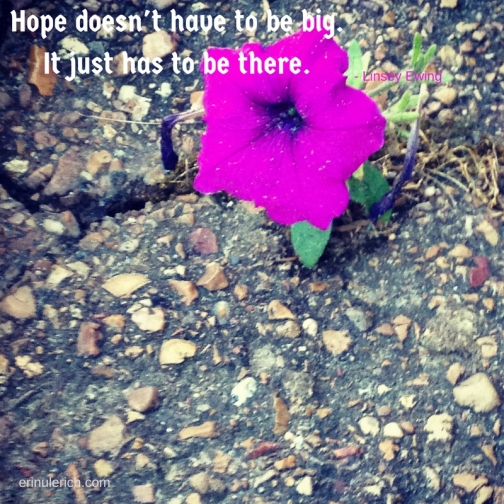
Here’s what I hope now: I hope my story helps you, whether or not you are mentally ill. I hope for some of you I put words to things you didn’t even know were in your heart, as Erin’s words did for me. I hope you see that the following list can apply to any situation that seems hopeless, not just facing Bipolar or another disease:
Oftentimes hope for me means getting out of bed in the morning, not going to bed in the afternoon, or setting a 30-minute timer for being in bed. Sometimes hope means hanging on when I know things will not look better in the morning or for many mornings after—when I know tomorrow will be just as bad if not worse than today. It means having faith that, when I’m doing things that hurt me, I will eventually stop—that at some point I will come back to baseline (or “normal”) and I will be able to sort out whatever mess I’ve gotten myself into.
Hope is forgiving myself for making those messes and planning for future messes. Hope is strategizing ways to keep myself safe when I’m not myself. It’s asking for help from those who love me and trusting that they do love me, even when I feel most unlovable. It means being open and honest about what I’m going through, with myself as well as with others. Hope means knowing I have a disease that is at best manageable, not curable, that it does and will affect me every day of my life, but that does not mean every day has to be affected by it.
The hardest part of being a Hope Warrior is knowing that my friends and family do not understand, not because they don’t love me, but because they are not me. They don’t understand because they are ignorant, and that is not their fault. They don’t feel and see and know what I do. If I want them to, I have to tell them, but my powers of description are limited, and I need to realize that they will never completely understand. My parents will continue to ask questions that hurt me. My friends will continue to invite me to do things that would be harmful to me. They can’t remember everything, and they are not responsible for my care.
Hope is remembering, when those things happen, that it does not mean I am unimportant or unloved. Hope is caring for myself instead of waiting for others to do it for me. Hope is choosing to see love as it is given to me, not only how I would prefer to receive it.
Hope is hard.
That’s why it takes a Warrior.
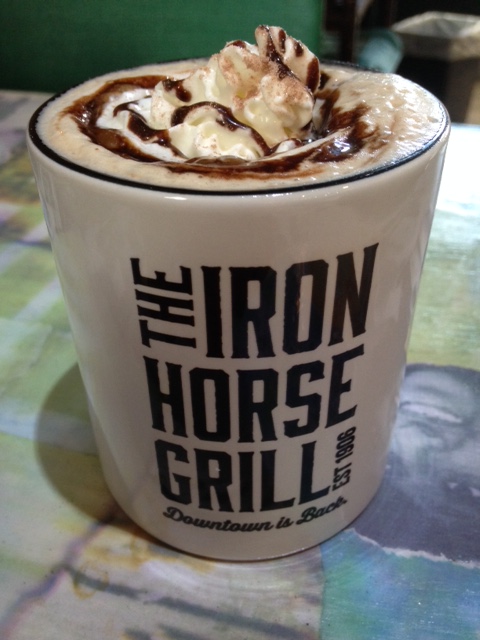



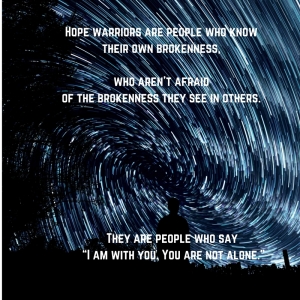

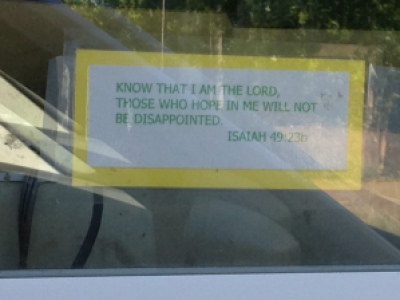

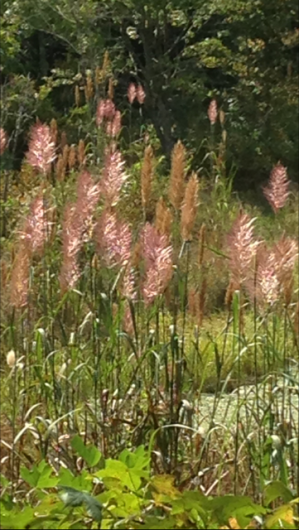
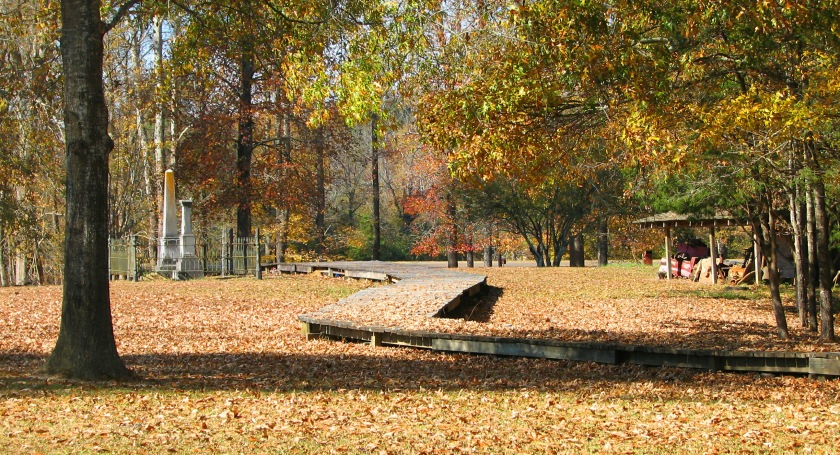

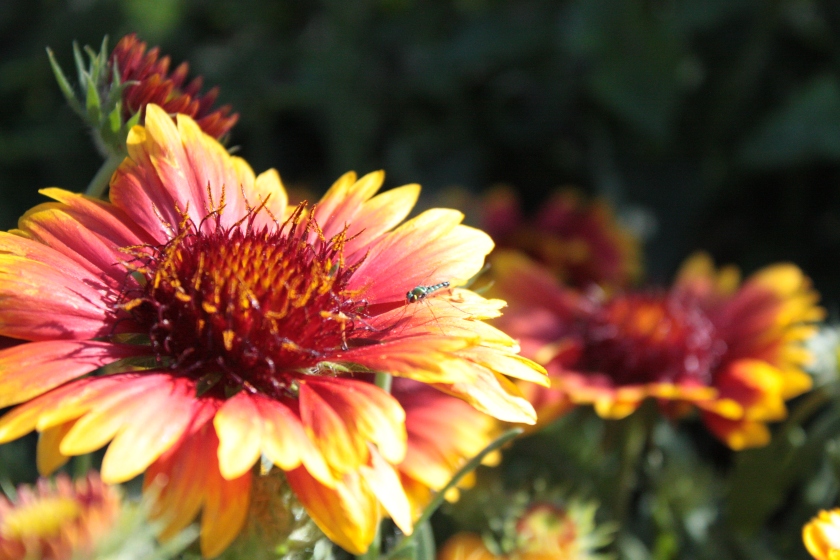




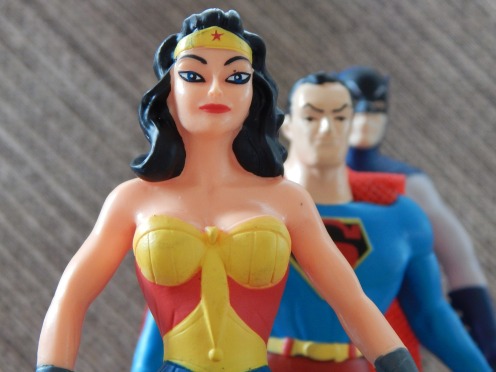
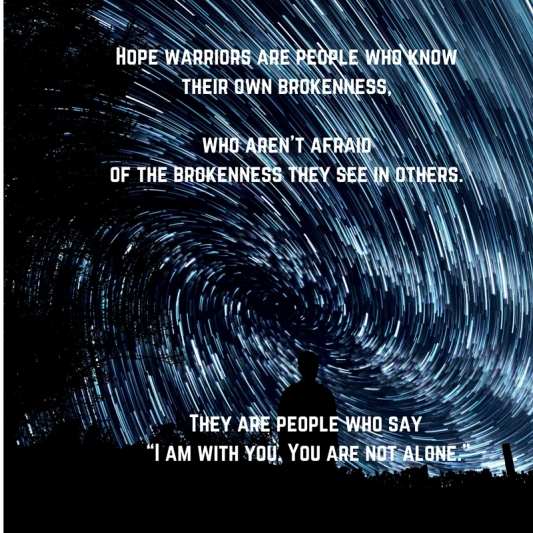

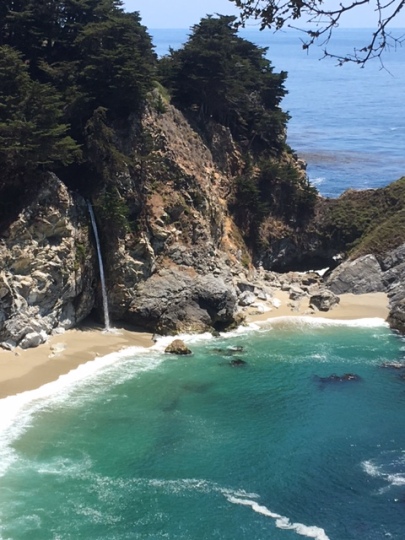 her in the links below.
her in the links below.
